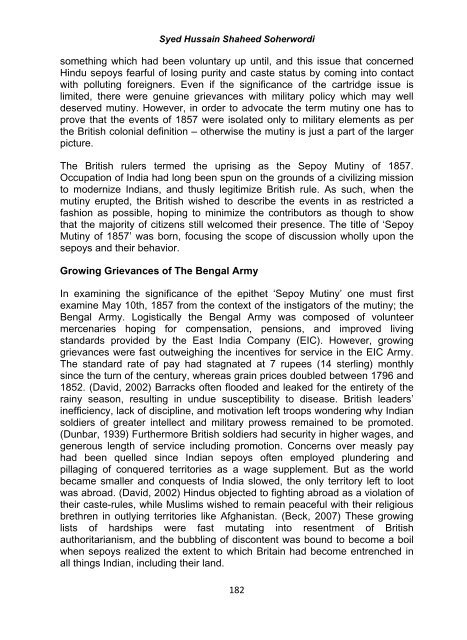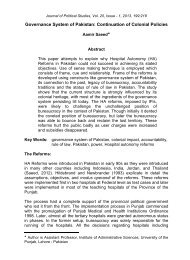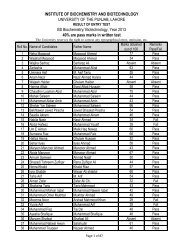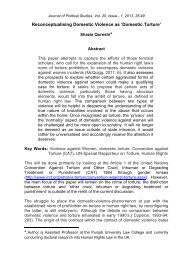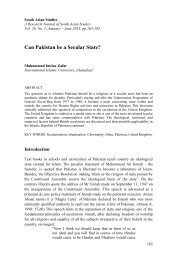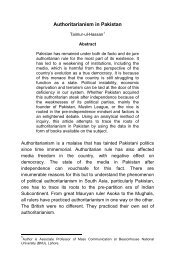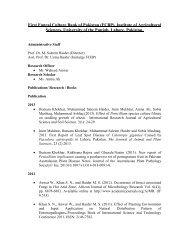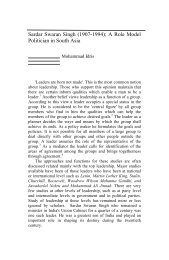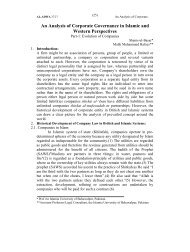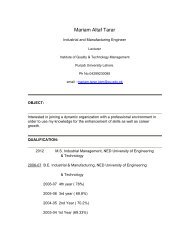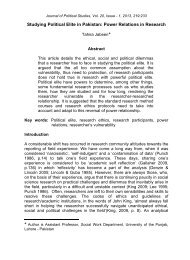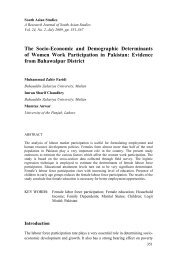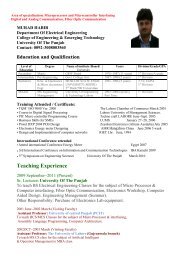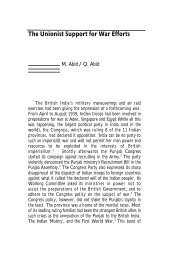The Significance of the Different Names Applied by Historians to the ...
The Significance of the Different Names Applied by Historians to the ...
The Significance of the Different Names Applied by Historians to the ...
You also want an ePaper? Increase the reach of your titles
YUMPU automatically turns print PDFs into web optimized ePapers that Google loves.
Syed Hussain Shaheed Soherwordi<br />
something which had been voluntary up until, and this issue that concerned<br />
Hindu sepoys fearful <strong>of</strong> losing purity and caste status <strong>by</strong> coming in<strong>to</strong> contact<br />
with polluting foreigners. Even if <strong>the</strong> significance <strong>of</strong> <strong>the</strong> cartridge issue is<br />
limited, <strong>the</strong>re were genuine grievances with military policy which may well<br />
deserved mutiny. However, in order <strong>to</strong> advocate <strong>the</strong> term mutiny one has <strong>to</strong><br />
prove that <strong>the</strong> events <strong>of</strong> 1857 were isolated only <strong>to</strong> military elements as per<br />
<strong>the</strong> British colonial definition – o<strong>the</strong>rwise <strong>the</strong> mutiny is just a part <strong>of</strong> <strong>the</strong> larger<br />
picture.<br />
<strong>The</strong> British rulers termed <strong>the</strong> uprising as <strong>the</strong> Sepoy Mutiny <strong>of</strong> 1857.<br />
Occupation <strong>of</strong> India had long been spun on <strong>the</strong> grounds <strong>of</strong> a civilizing mission<br />
<strong>to</strong> modernize Indians, and thusly legitimize British rule. As such, when <strong>the</strong><br />
mutiny erupted, <strong>the</strong> British wished <strong>to</strong> describe <strong>the</strong> events in as restricted a<br />
fashion as possible, hoping <strong>to</strong> minimize <strong>the</strong> contribu<strong>to</strong>rs as though <strong>to</strong> show<br />
that <strong>the</strong> majority <strong>of</strong> citizens still welcomed <strong>the</strong>ir presence. <strong>The</strong> title <strong>of</strong> ‘Sepoy<br />
Mutiny <strong>of</strong> 1857’ was born, focusing <strong>the</strong> scope <strong>of</strong> discussion wholly upon <strong>the</strong><br />
sepoys and <strong>the</strong>ir behavior.<br />
Growing Grievances <strong>of</strong> <strong>The</strong> Bengal Army<br />
In examining <strong>the</strong> significance <strong>of</strong> <strong>the</strong> epi<strong>the</strong>t ‘Sepoy Mutiny’ one must first<br />
examine May 10th, 1857 from <strong>the</strong> context <strong>of</strong> <strong>the</strong> instiga<strong>to</strong>rs <strong>of</strong> <strong>the</strong> mutiny; <strong>the</strong><br />
Bengal Army. Logistically <strong>the</strong> Bengal Army was composed <strong>of</strong> volunteer<br />
mercenaries hoping for compensation, pensions, and improved living<br />
standards provided <strong>by</strong> <strong>the</strong> East India Company (EIC). However, growing<br />
grievances were fast outweighing <strong>the</strong> incentives for service in <strong>the</strong> EIC Army.<br />
<strong>The</strong> standard rate <strong>of</strong> pay had stagnated at 7 rupees (14 sterling) monthly<br />
since <strong>the</strong> turn <strong>of</strong> <strong>the</strong> century, whereas grain prices doubled between 1796 and<br />
1852. (David, 2002) Barracks <strong>of</strong>ten flooded and leaked for <strong>the</strong> entirety <strong>of</strong> <strong>the</strong><br />
rainy season, resulting in undue susceptibility <strong>to</strong> disease. British leaders’<br />
inefficiency, lack <strong>of</strong> discipline, and motivation left troops wondering why Indian<br />
soldiers <strong>of</strong> greater intellect and military prowess remained <strong>to</strong> be promoted.<br />
(Dunbar, 1939) Fur<strong>the</strong>rmore British soldiers had security in higher wages, and<br />
generous length <strong>of</strong> service including promotion. Concerns over measly pay<br />
had been quelled since Indian sepoys <strong>of</strong>ten employed plundering and<br />
pillaging <strong>of</strong> conquered terri<strong>to</strong>ries as a wage supplement. But as <strong>the</strong> world<br />
became smaller and conquests <strong>of</strong> India slowed, <strong>the</strong> only terri<strong>to</strong>ry left <strong>to</strong> loot<br />
was abroad. (David, 2002) Hindus objected <strong>to</strong> fighting abroad as a violation <strong>of</strong><br />
<strong>the</strong>ir caste-rules, while Muslims wished <strong>to</strong> remain peaceful with <strong>the</strong>ir religious<br />
brethren in outlying terri<strong>to</strong>ries like Afghanistan. (Beck, 2007) <strong>The</strong>se growing<br />
lists <strong>of</strong> hardships were fast mutating in<strong>to</strong> resentment <strong>of</strong> British<br />
authoritarianism, and <strong>the</strong> bubbling <strong>of</strong> discontent was bound <strong>to</strong> become a boil<br />
when sepoys realized <strong>the</strong> extent <strong>to</strong> which Britain had become entrenched in<br />
all things Indian, including <strong>the</strong>ir land.<br />
182


